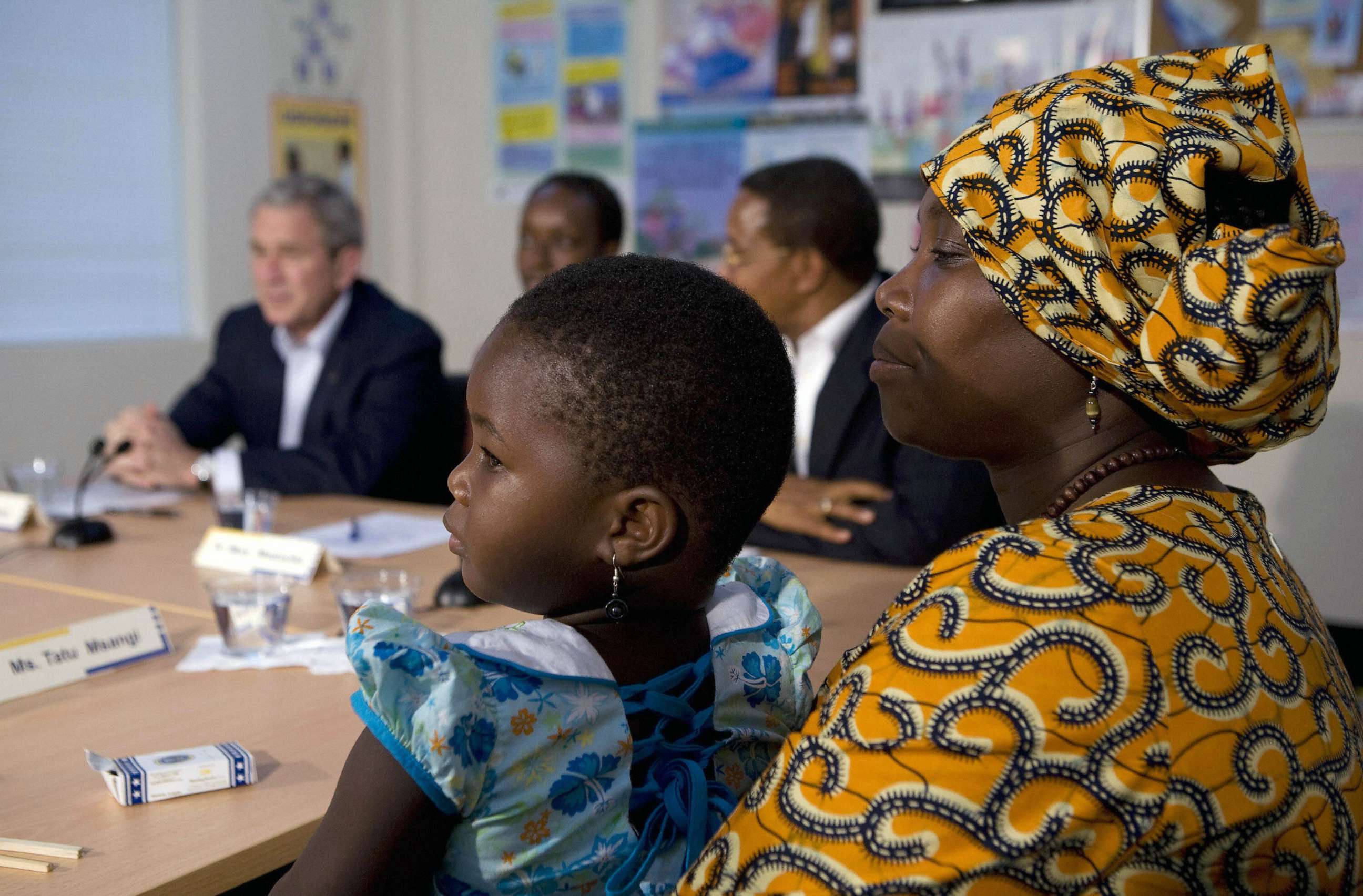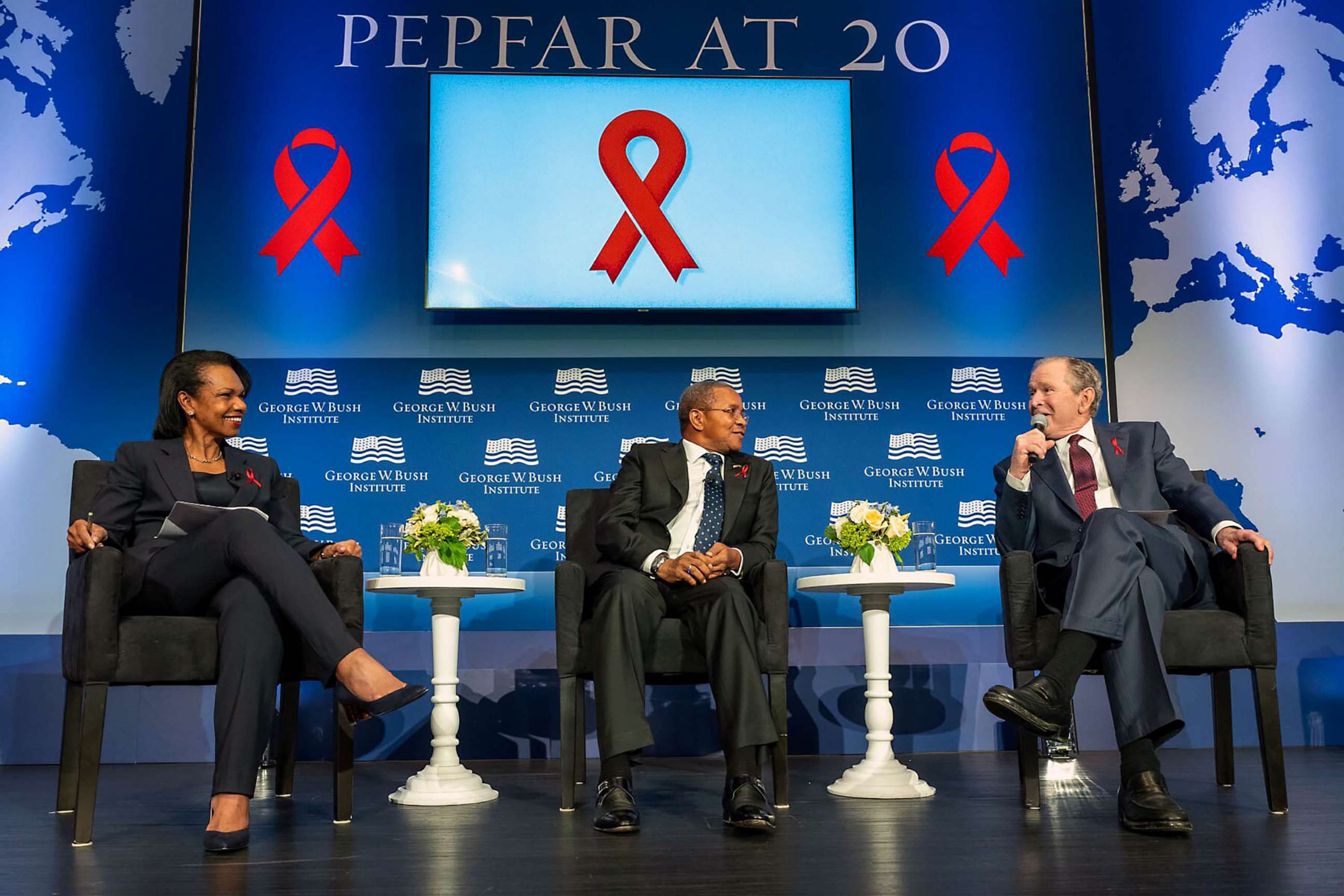Historic Bush-era HIV/AIDS initiative celebrates 20th anniversary
Since PEPFAR's inception, the program has saved more than 25 million lives.
In 2004, Tatu Msangi, an expectant mother in Tanzania, learned she had HIV. While she said she was shocked by her diagnosis, the risk the virus posed to her baby's health scared her the most.
But after speaking with a health counselor at the Kilimanjaro Christian Medical Center, Msangi learned there was medicine she could take to reduce the likelihood of transmitting HIV to her child -- treatment made possible and free by support from the U.S. President's Emergency Plan for AIDS Relief (PEPFAR), launched by then-President George W. Bush.
"Previously, the treatment was not there. And if it was to buy, I don't think we can afford, but providing medicine for free saves many communities," Msangi told ABC News.
Msangi's daughter, whom she named Faith, is now 17 years old. She is among the 5.5 million children born HIV-free, thanks to PEPFAR, the largest commitment ever by any nation to address a single disease and a historic bipartisan achievement in the U.S. The program celebrates its 20th anniversary this year.
"I'm really grateful to PEPFAR because they did a great job on creating an HIV-free generation, and my daughter is an example," she said.

Making a rare public appearance in Washington, D.C., Bush -- who announced PEPFAR's launch in his 2003 State of the Union address --discussed the program's legacy during a Friday event titled "PEPFAR at 20," hosted by the George W. Bush Institute at the U.S. Institute of Peace.
"If you're interested in peace, health equity is a foundation for peace. It's hard to have peace in a society in which a disease is ravaging the villages and the people," Bush said.
Before PEPFAR, the HIV/AIDS pandemic killed millions across the globe, tearing through sub-Saharan Africa -- the virus's epicenter -- where less than 50,000 people living with HIV had access to antiretroviral therapy.
Millions of infants in the region were born with HIV or orphaned due to AIDS, according to the Joint United Nations Program on HIV and AIDS (UNAIDS).
Since PEPFAR's inception, the program has invested more than $100 billion in the global HIV/AIDS response, including prevention, care, and treatment, maintaining strong bipartisan support across U.S. presidential administrations and congresses.
The PEPFAR at 20 event also marked the one-year anniversary of Russia's invasion of Ukraine, as the war continues to disrupt healthcare for thousands in the country living with HIV. Last year, the U.S. government dedicated $13 million through PEPFAR to providing life-saving medications and services to Ukraine.
Ukrainian HIV/AIDS advocate Dmytro Sherembei said he is "living evidence" of the program's success.
"I am everyday taking these pills -- and 120,000 people in Ukraine," Sherembei said at the event, showing the audience a bottle of his HIV medication.

In addition to saving more than 25 million lives across 50 countries, PEPFAR's work has laid the foundation for sustainable health systems in partner countries.
"African nations were more likely to be able to deal with COVID because of the PEPFAR platform, and what a great contribution to not only saving lives but leaving behind a healthcare structure that had not existed prior to 2003," Bush said.
Last year, the Bush Institute released a series of six reports examining lessons learned from PEPFAR, including the importance of collecting real-time age-segmented and sex-disaggregated data as well as cultivating partnerships between host governments and communities abroad.
Former U.S. Global AIDS Coordinator Dr. Deborah Birx, who co-wrote the reports, said fighting the ongoing COVID-19 pandemic requires heeding these lessons. Birx also served as the White House Coronavirus Response Coordinator under the Trump administration.
"We've been battling pandemics around the globe in a really organized way from PEPFAR to PMI to other international programs," Birx, a senior fellow at the Bush Institute, told ABC News. "Yet we are, I think, sometimes too arrogant to bring those lessons home and say, 'we're not really perfect here in America, and we can learn from others.'"
PEPFAR is also touted as a massive win for U.S. foreign policy, helping to stabilize and strengthen democratic governments, promote economic growth, and advance progress on human rights.

"I think we're a big enough nation to do more than one thing -- and continuing to fight against AIDS on the continent of Africa and supporting the Ukrainian freedom fighters is not going to constrain our capacity to help our own citizens," Bush said, responding to calls for the U.S. to stay out of foreign affairs.
However, as countries across the world confront multiplying crises, progress toward stemming the spread of HIV/AIDS is under threat.
International funding for HIV/AIDS relief and other global health priorities has waned — at 6 percent less in 2021 compared to 12 years ago — which could cost 7.7 million lives over the next decade, UNAIDS reported.
"There have been some segments in countries that have not received the benefits. Children need more attention. The LGBTQ populations in these countries need more attention. But there is an end in sight," David J. Kramer, Bush Institute executive director, told ABC News. "And as long as that is possible, we still have more work to do."
In January, the Bush Institute issued recommendations and short analyses on policy challenges facing the nation, including briefs focused on PEPFAR, such as proposing Congress reauthorize and fully fund PEPFAR and the Global Fund this year.
PEPFAR is also undertaking a new five-year strategy, Fulfilling America's Promise to End the HIV/AIDS Pandemic by 2030, to accelerate the response to the HIV/AIDS pandemic and close health equity gaps in children, adolescent girls, young women, and other key populations.

Now a high school student, Faith, who is preparing to attend university and pursue a career in interior design, said she shares her story with her peers to help destigmatize HIV.
As a public health nurse, Msangi counsels other HIV-positive women, educating them on mother to child transmission (PMTCT) programs and encouraging screenings for cervical cancer. She is also an ambassador for the Elizabeth Glaser Pediatric AIDS Foundation.
"We have to walk together hand by hand on creating an HIV-free generation," Msangi said. "I think it's possible."




